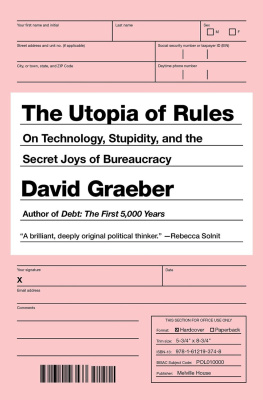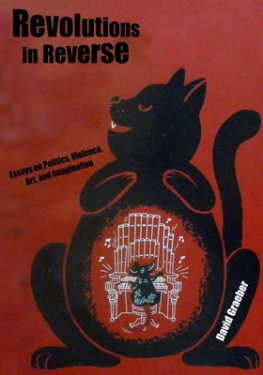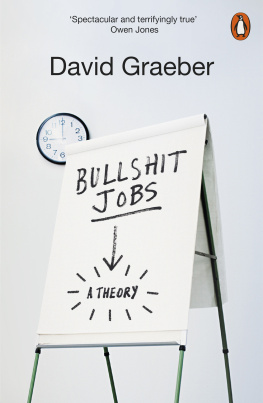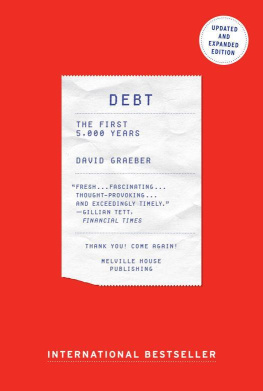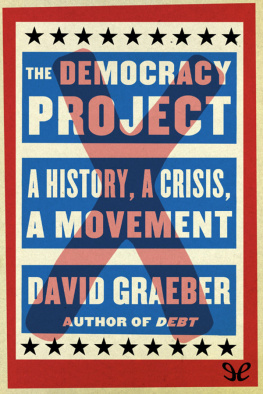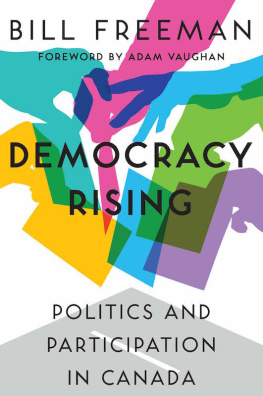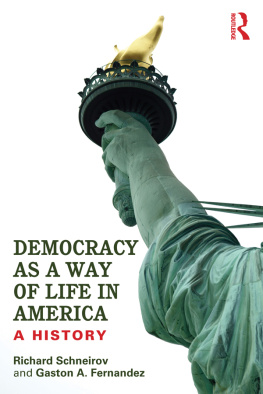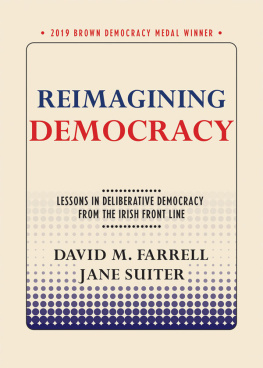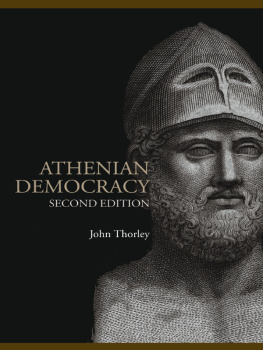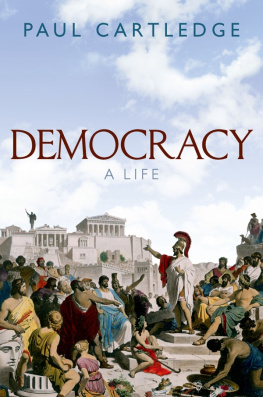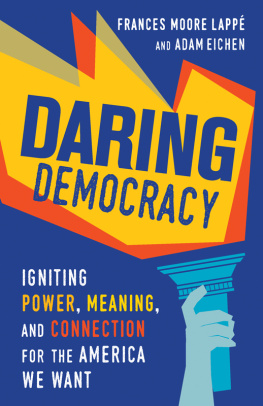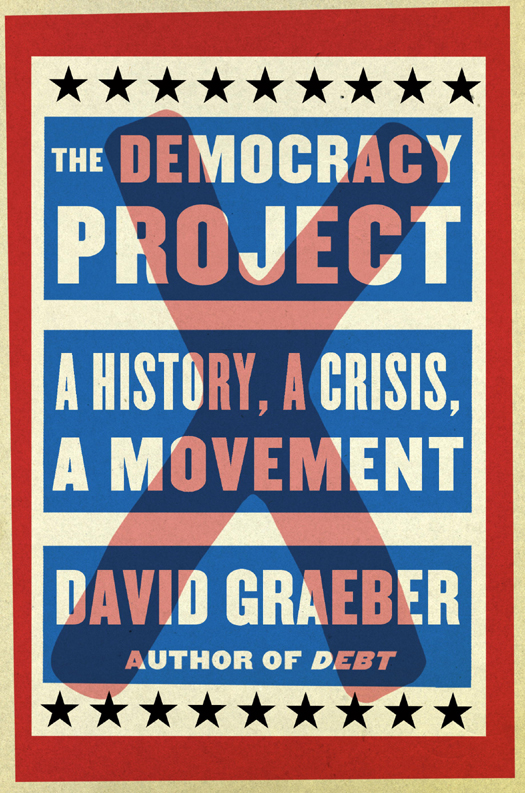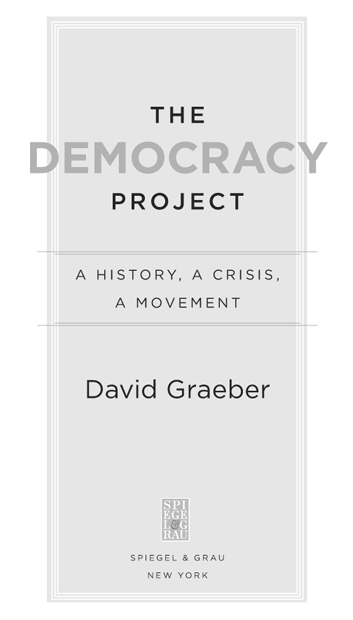
The Democracy Project is a work of nonfiction.
Some names and identifying details have been changed.
Copyright 2013 by David Graeber
All rights reserved.
Published in the United States by Spiegel & Grau, an imprint of The Random House Publishing Group, a division of Random House, Inc., New York.
S PIEGEL & G RAU and Design is a registered trademark of Random House, Inc.
Grateful acknowledgment is made to
The Weekly Standard for permission to reprint an excerpt from Anarchy in the U.S.A.: The Roots of American Disorder by Matthew Continetti, The Weekly Standard, November 28, 2011. Reprinted by permission.
LIBRARY OF CONGRESS CATALOGING-IN-PUBLICATION DATA
Graeber, David.
The Democracy Project : a history, a crisis, a movement / David Graeber.
p. cm.
Includes bibliographical references.
eISBN: 978-0-679-64600-6
1. DemocracyHistory. I. Title
JC421.G677 2013
321.8dc23 2012031998
www.spiegelandgrau.com
Jacket design: Jamie Keenan
v3.1
CONTENTS
INTRODUCTION
On April 26, 2012, about thirty activists from Occupy Wall Street gathered on the steps of New Yorks Federal Hall, across the street from the Stock Exchange.
For more than a month, we had been trying to reestablish a foothold in lower Manhattan to replace the camp wed been evicted from six months earlier at Zuccotti Park. Even if we werent able to establish a new camp, we were hoping to at least find some place we could hold regular assemblies, and set up our library and kitchens. The great advantage of Zuccotti Park was that it was a place where anyone interested in what we were doing knew they could always come to find us, to learn about upcoming actions or just talk politics; now the lack of such a place was causing endless problems. The city authorities, however, had decided that we would never have another Zuccotti. Wherever we found a spot we could legally set up shop, they simply changed the laws and drove us off. When we tried to establish ourselves in Union Square, city authorities changed park regulations. When a band of occupiers started sleeping on the sidewalk on Wall Street itself, relying on a judicial decision that explicitly said citizens had a right to sleep on the street in New York as a form of political protest, the city deemed that part of lower Manhattan a special security zone in which the law did not apply.
Finally, we settled on the Federal Hall steps, a broad marble staircase leading up to a statue of George Washington, guarding the door to the building in which the Bill of Rights had been signed 223 years before. The steps were not under city jurisdiction; they were federal land, under the administration of the National Park Service, and representatives of the U.S. Park Policecognizant, perhaps, that the entire space was considered a monument to civil libertieshad told us they had no objections to our occupying the steps, as long as no one actually slept there. The steps were wide enough that they could easily accommodate a couple of hundred people, and at first, about that many occupiers showed up. But before long, the city had moved in and convinced the parks people to let them effectively take over: theyd erected steel barriers around the perimeter, and others that divided the steps themselves into two compartments. We quickly came to refer to them as the freedom cages. A SWAT team was positioned by the entrance, and a white-shirted police commander carefully monitored everyone who tried to enter, informing them that for safety reasons no more than twenty people were allowed in either cage at any time. Nonetheless, a determined handful persevered. They kept up a twenty-four-hour presence, taking shifts, organizing teach-ins during the day, engaging in impromptu debates with bored Wall Street traders who wandered over during breaks, and keeping vigil on the marble stairs at night. Soon large signs were banned. Then anything made of cardboard. Then came the random arrests. The police commander wanted to make clear to us that, even if he couldnt arrest all of us, he could certainly arrest any one of us, for pretty much any reason, at any time. That day alone I had seen one activist shackled and led off for a noise violation while chanting slogans, and another, an Iraq war veteran, booked on public obscenity charges for using four-letter words while making a speech. Perhaps it was because wed advertised the event as a speak-out. The officer in charge seemed to be making a point: even at the very birthplace of the First Amendment, he still had the power to arrest us just for engaging in political speech.
A friend of mine named Lopi, famous for attending marches on a giant tricycle emblazoned with a colorful placard that read Jubilee! had organized the event, billing it as Speak Out of Grievances against Wall Street: A Peaceable Assembly on the steps of the Federal Hall Memorial Building, the birthplace of the Bill of Rights which is currently under lock down from the army of the 1%. Myself, Ive never been much of a rabble-rouser. During the entire time Id been involved in Occupy, Id never once made a speech. So I was hoping to be there mainly as a witness, to provide moral and organizational support. For much of the first half hour of the event, as one occupier after another moved to the front of the cage, before an impromptu collection of video cameras on the sidewalk, to talk about war, ecological devastation, the corruption of government, I lingered on the margins, trying to chat up the police.
So youre part of a SWAT team, I said to one grim-faced young man guarding the entrance to the cages, a large assault rifle at his side. Now, what does that stand for, SWAT? Special Weapons
and Tactics, he saidquickly, before I would have any chance to get out the original name for the unit, which was Special Weapons Assault Team.
I see. So Im curious: what sort of special weapons do your commanders think might be required to deal with thirty unarmed citizens engaging in peaceable assembly on the federal steps?
Its just a precaution, he replied uncomfortably.
Id already passed up two invitations to speak, but Lopi was persistent, so eventually, I figured Id better say something, however brief. So I took my place in front of the cameras, glanced up at George Washington gazing at the sky over the New York Stock Exchange, and started improvising.
It strikes me that its very appropriate that we are meeting here, today, on the steps of the very building where the Bill of Rights was signed. Its funny. Most Americans think of themselves as living in a free country, the worlds greatest democracy. They feel its our constitutional rights and freedoms, placed there by our Founding Fathers, that define us as a nation, that make us who we really areeven, if you listen to politicians, that give us the right to invade other countries more or less at will. But actually, you know, the men who wrote the Constitution didnt want it to include a Bill of Rights. Thats why theyre amendments. They werent in the original document. The only reason that all those ringing phrases about freedom of speech and freedom of assembly ended up in the Constitution is because anti-Federalists like George Mason and Patrick Henry were so outraged when they saw the final draft that they began to mobilize against ratification unless the text was changedchanged to include, among other things, the right to engage in that very kind of popular mobilization. That terrified the Federalists since one of the reasons they convened the Constitutional Convention to begin with was to head off the danger they saw of even more radical popular movements that had been calling for a democratization of finance, even debt cancellation. Mass public assemblies and an outbreak of popular debate like theyd seen during the revolution was the very last thing they wanted. So eventually, James Madison gathered up a list of more than two hundred proposals, and used them to write the actual text of what we now call the Bill of Rights.


